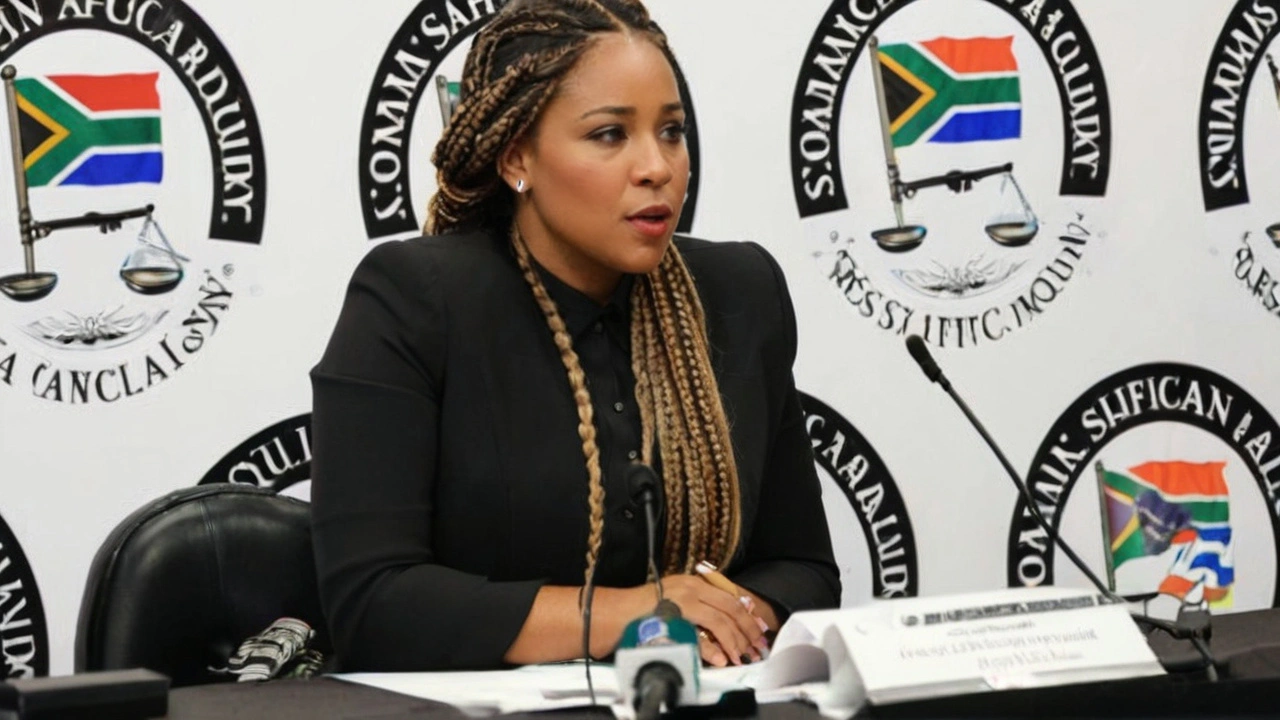Extradition and Legal Troubles
Moroadi Cholota, the former personal assistant to ex-Free State Premier Ace Magashule, has been extradited from the United States to South Africa. Her return comes as a significant development in the ongoing investigation into the multi-million-rand Free State asbestos corruption scandal. Cholota, once a key figure expected to provide pivotal testimony, finds herself at the center of a legal storm.
Upon her arrival at OR Tambo International Airport, Cholota will be greeted not with family or friends but by the South African Police Service (SAPS) and Interpol. This rigorous security detail underscores the gravity of the charges and the importance of her extradition. The Directorate for Priority Crime Investigation (Hawks) awaits her handover to intensify their investigation into the high-profile asbestos case.
From Witness to Defendant
Cholota's journey from being a state witness to an arrested suspect is both intriguing and alarming. Initially set to aid the authorities in unraveling the details of the asbestos graft scheme, her refusal to cooperate resulted in a drastic turn of events. The state issued a warrant for her arrest, a step illustrating the seriousness of her non-compliance.
Her former boss, Ace Magashule, is no stranger to controversy. Alongside 17 co-accused, including the ex-Mangaung mayor Olly Mlamleli and businessman Edwin Sodi, Magashule faces severe allegations of corruption, fraud, and money laundering. These charges all stem from a project intended to eradicate asbestos roofing from homes, with the goal of improving residents’ health and safety. Alas, the initiative became marred by corrupt practices, leading to profound legal repercussions.
A Weekend in Custody
Cholota now faces the immediate reality of spending the weekend behind bars. Her first court appearance is scheduled for Monday at the Bloemfontein Magistrate's Court. The drama surrounding her case is emblematic of the broader issues of corruption and mismanagement that have plagued South Africa's governance systems for years.
The extradition process itself was lengthy and complex. It commenced with a 2022 application by South African authorities to their U.S. counterparts. The eventual ruling by a U.S. court in favor of the extradition marks a milestone but also highlights the intricate legal maneuverings often involved in such high-stakes international cases.
Free State Asbestos Scandal Overview
The asbestos scandal has sent ripples across the Free State province. The original aim of the project, to replace hazardous asbestos roofing, quickly became overshadowed by scandal. Funds allocated for the project allegedly found their way into the pockets of corrupt officials and businessmen, instead of aiding the intended beneficiaries. This misuse of resources not only failed to improve public safety but also eroded public trust in governmental projects and institutions.
With the principal players in the dock and the trial set for mid-next year, the country watches closely. The events set to unfold could redefine the fight against corruption within South Africa, potentially setting precedents for how such cases are handled in the future. From procedural fairness in extraditions to the accountability of high-profile individuals, the case encapsulates a myriad of legal, ethical, and political challenges.
What Lies Ahead
The court will serve as the battleground where these complex dynamics play out. For Moroadi Cholota, the stakes couldn't be higher. Her appearance in the Bloemfontein court next week will be a critical moment, not just for her but for all parties embroiled in the scandal. Depending on the proceedings, her testimony could either incriminate her further or potentially offer avenues for leniency.
Ace Magashule and his co-accused will undoubtedly follow her case closely. The unfolding of these events could sway public opinion and impact the political reputations of those involved. While corruption allegations are, regrettably, not new to South Africa, the magnitude of this case and the personalities involved have captured widespread attention.
Impact on Public Trust
The asbestos scandal represents more than just a failed project; it illustrates a significant breach of trust between the government and its people. Public confidence in the capability and integrity of officials to carry out essential social projects is at an all-time low. The proceedings and eventual verdict of this case will play a crucial role in either restoring or further eroding that trust.
The legal implications extend beyond individual guilt or innocence. They reach into the fabric of governance and accountability. Successful prosecution could embolden further investigations and lead to more stringent measures against corruption. Conversely, any perceived weaknesses in the trial process could undermine efforts to hold corrupt officials accountable.
Conclusion
As the weekend progresses and Moroadi Cholota remains in custody, the focus shifts to the forthcoming court appearance. The journey from state witness to extradited inmate underscores the entwined nature of loyalty, legal obligations, and governance ethics. Cholota, Magashule, and the other accused face a judicial process that promises to be intense and closely scrutinized.
The months leading up to the trial will be critical. Investigators, prosecutors, and defense teams will meticulously prepare, knowing the immense public and political stakes involved. The real challenge lies in navigating the labyrinth of legal and ethical issues to reach a resolution that serves justice and restores faith in South Africa’s institutions.
Moroadi Cholota's case, set against the backdrop of the Free State asbestos scandal, offers a stark reminder of the importance of integrity in public service. Whether this chapter ends with justice served remains to be seen, but its impact will resonate across South African society, compelling a deeper conversation about the true cost of corruption.

